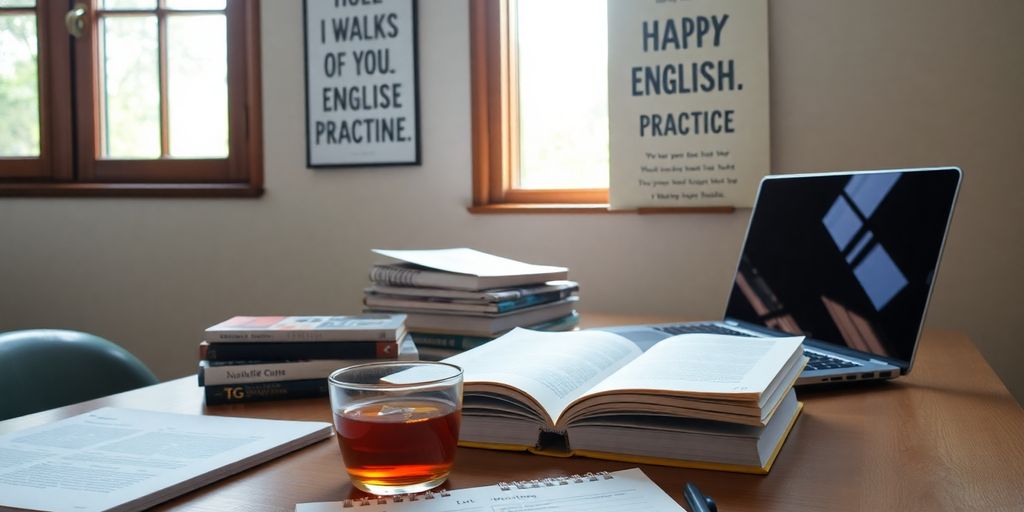How to prepare for IELTS at home : Complete Guide
In this article we discuss about How to prepare for IELTS at home could be problematic but trust me it is not as big of a deal as it seems. All the essentials can be processed from home, with a proper strategy and the right equipment. You’ll find all the information you need here – from the description of the test to the use of online resources and daily practice in English. Okay, let’s go further and find out how it is possible to prepare for the IELTS without leaving home.
Table of Contents
Key Takeaways
Understand the how to prepare for IELTS at home format, including all four sections: Tentatively called Listening, Reading, Writing, and Speaking.
Schedule each part of the material so that the student covers all the parts at the same time and pay attention to the missed topics.
Use websites containing exercises, videos, applications to make preparation for tests more effective.
Take English practice every day by speaking, reading, and getting immersed with English materials to fast track your skillset.
Understand strategies as time management and question analysis to apply in the examination to achieve high self esteem during the examination.

The format of the IELTS Test
Be Well Acquainted with the Four Parts
The IELTS test is divided into four main sections: Looking at the four Language Acquisition skills, they include Listening, Reading, Writing and Speaking. All the sections are applied to assess various aspects of your English language ability. The Listening section requires the listener to listen to four recordings and answer questions that are related to the recordings. The Reading section is designed to check your understanding of the passages and the questions answered in the context of passages. The Writing section comprises two tasks, which mostly include reading, analyzing data and writing an essay. Finally, the speaking is an actual conversation with an examiner who will present some topics of your interest.
Know the Timing for Each Section
The length of each part is important to know so students know how much time they will have during the exam. Here’s a quick breakdown:
Listening: 30 minutes
Reading: 60 minutes
Writing: 60 minutes
Speaking: 11-14 minutes
A particular segment of the exam has a certain amount of time allowable to complete it, and it is advisable to master the exams under these time limits.
How to prepare for IELTS at home : Scoring Criteria
The IELTS test ranges from a band scale of 0 to 9, IELTS Academic and General Training modules are reported on a band scale and each section of the test also has its own band score. What needs to be understood is that each section has its own requirements. For instance, the Writing section is pass/fail based on task achievement, coherence, lexical resource, and grammatical accuracy. The following criteria are important for preparing for the paper and aim to enhance the scores Islahi and Ahmad, 2013:
So let me remind you that being familiar with the test format is the same as having a map before a trip. They enable you to take the test with ease and confidence.
The right study timetable is the most critical element in study time management.
Time Every Section of the Book
To begin with; there is a need to allocate your study time appropriately. The IELTS has four sections: For the language it has Listening, Reading, Writing and Speaking. All three are different from each other in terms of skills and patterns. You have to ensure that you allocate particular time for the completion of each part. For instance, you might wish to devote more hours on Writing since that is your area of difficulty, or distribute time evenly if you are the kind who wants overall development.
Focus on Your Weaknesses
Like they say everyone has their weak point does not apply to him right? All these areas are the sections that may be causing trouble whether it’s the Reading section that is problematic or Speaking is your weakness. The resources have provided detailed information that needs extra time to go through the sections. They also make guessing of correct answers easier in a bid to identify areas of weakness. If you are aware of them, focus on those vulnerabilities with certain exercises and practice questions.

Include Regular Breaks
Writing many long papers, sitting for numerous hours at a time seems productive, but it’s not. It is as needed as your body has to listen to your brain and let it have some time for the regular processing of the new information. Take regular time offs so that you do not tamper with your freshness when working. It is advised socially to have a 5-10 minute break every one hour. It’s time for exercise and you can either stand up and stretch or grab a small snack or take a breather and sit down. I assure you, these breaks will actually help you make your study sessions more productive.
By managing your study time with your breaks and identifying your areas of weakness, learning for the IELTS becomes much less stressful. Make sure that you stick to your schedule for the lesson but observe flexibility at the same time as the lesson goes on.
Applying Thoughts about the Use of the Internet for IELTS Preparation
Explore Free and Paid Options
Everyone who needs to take the How to prepare for IELTS at home knows that the best source of information is the internet. Nowadays there are numerous guides available online – free and paid, so you can follow the information before ordering a paper if you decide that writing it on your own is too difficult for you. Beginning with Learn English at the British Council website, which has practice tests, exercises, and tips on all segments of the IELTS test. Then if you are still in need of a more structured approach go for the Magoosh IELTS which is paid but offers video lessons and study plans. IN this blog will helpful to achieve How to prepare for IELTS at home easily.
Use Official Practice Tests
To say that official practice tests are a blessing for people when preparing for IELTS would not be an overstatement. They provide the actual feel of the exam and help understand the position of a candidate. Some of these tests can be found on websites such as IELTS.org and the British Council which are as close as it gets to tasting the real thing. It is advisable to set time limits while taking these tests as would be the case when taking the real exams. This will be equally helpful when you’re on the wedding day and especially when taking the photos you require.
Use videos, lessons, apps and other related content
Certainly, any form of instructional videos and apps helps make learning less of a tedious and more of an engaging process. There are many sources such as IELTS Liz that provides video tutorials and practical exercises for all the parts of the IELTS. Combined with them, one can easily activate the brain’s visual and aural facilities and learn on the go Since these resources are easily accessible, they are convenient to use at any time of the day. It is advisable to incorporate these tools, and other study aids, in a non-monotonous fashion, just to keep the learner interested.
There is no doubt that utilization of available internet resources can greatly improve your IELTS practice. Flashcards, games, and quizzes; free and paid practice materials; and official tests for the CLEP, DSST, and AP are all available to you, helping to increase your likelihood of passing.
Building Up Everyday Use of English
Speak More English
Thinking and speaking English is the best way to familiarise with the language. Make an effort to use English each day – even if it is for only a small amount of time. This could be with friends, family or even partners to whom you do the language exchanging with online. This is why I insist on the use of English in real-life contexts because the mind operates and responds naturally within real-life contexts. Slowly and steadily, the ability to agree and disagree will become easier to execute out of natural interaction with the language as it has with Kasugeno, and as it gets easier, so does the stress associated with it.
It is recommended to read as it helps to build up the reader’s vocabulary based on a set of readings in general and to get acquainted with different types of writings. These may be novels, news articles, or even blog posts; the more interesting the topic is to the writer, the more fun it will be to write. Underline all the words you do not understand and find what they mean. Not only that, but as an additional feature, this also allows you to see how words are actually used in sentences. It is advisable to read some amount each day in order to achieve the favorable habit. If you are Masters in education it will be more easy.
Daily Free Streaming of English Movies and Podcasts
Listening in the form of movies, and Pod casts ensures that the language used is English hence enhancing your listening skills. Select content that makes you happy in order not to make a chore out of it. Listen the different intonations of voice and other aspects of people’s communicative behavior. If you are a beginner, you can opt for subtitle, but I suggest you to avoid using subtitle after some time for a harder learning session. With this method, you do not only get to learn how people speak English but also learn aspects of their culture.
Applying Test-taking Measures
Master Time Management
Time management is very important during the IELTS exam as a candidate. In the interest of time, different sections of the test are timed, and doing as many of these practice tests under these conditions encourages familiarity with the time constraints. For example, during the Reading section, bear in mind that scanning through the passages is more beneficial than attempting to read them thoroughly before actually reading the questions. This will not only save time but will also enable you to make a better search that will lead to the answers being found more frequently. In the Writing section divide the time evenly between two tasks, allowing yourself enough time to develop strategies for answers, write the answers, and review the answers.
How to prepare for IELTS at home : Multiple-Choice Questions
That is why it’s important to highlight some principles of solving multiple-choice questions properly. First, try to read the questions and then listen to the audio, or read the text. This makes it easy for you to know what to either listen or look at. Reduce your options with invalid responses As a general rule, it can be helpful to decreasing your choices if such answers are wrong. Bear in mind that the answer may not be a word for word match with the text, so just be on the lookout for any synonyms or rewritings of the text.
Get acquainted with skimming and scanning techniques
In the Reading test of Reading, two strategies are really important: skimming and scanning. In particular, while skimming lets a user read the text to get general information and the overall idea of it, scanning helps a user find specific data. Accustom yourself with them while reading a text in order to improve your speed and understanding. This activity involves the identification of primary only by looking at section and subsection titles together with the first lines of the first, last, and middle paragraphs. For scanning the information look for some keywords associated with the questions. You can learn how to practice into answers effectively in a shorter period of time; in other words, you will become more brilliant in responding to questions.
It is always essential to understand that in order to learn and perfect all these strategies it will require some time. Practice them often and you will be able to tackle the IELTS questions with a lot more proficiency and convenience.
Evaluating Your Current Level Of English
SWOT Analysis
Thus, it makes perfect sense to find out where you are at, before starting your IELTS preparation. Being aware of this is crucial: strengths and weaknesses. Are you a great writer, but have difficulties in speaking? It could be that you easily comprehend when listened to, but have lots of difficulties when reading. Jot these down.
Practice Tests should be used for Assessment.
Create some opportunities to use some practice tests and check your results. They’re like a mirror that reveals all the things that mess up. Check various sections out and see what you did best and where perhaps you need to focus your efforts. While it is okay, better still to get many things right, it is even more important to know why you got them wrong.
A realistic goal improvement target is to attempt at achieving betterment in a given sphere of interest or activity.
Once you know your areas of weakness, it is time to set some goals, based on that information. But, keep it real. What you need to do is avoid trying to jump all the way up to the top of the marketing food chain right away. Break it down. Perhaps, you need help to raise your speaking score, for instance, from band three up to band four. Make a plan and stick to it.
Try a speaking buddy
Locating a speaking partner will definitely help when you are preparing for the IELTS in the comfort of your home. It became not just about having someone to talk to, but to encourage, and to give feedback to, and to be encouraged by. You can arrange the times when one person chooses the theme, just as in the IELTS speaking practice. This lets you have an opportunity of practicing fluency, coherence , and pronunciation while being at a relaxed state. In addition, you can correct a mistake or overlook it and suggest the right solution to the other person.
Use Shadowing Techniques
It is very useful to enhance fluency and pronunciation; This is actually called ‘shadowing’. Select an episode of a TEDTalk or a podcast that you have never listened to before and listen to ten minutes of it. Try to imitate the speaker exactly after a certain number of lines or even a sentence. It assists you to develop some familiarity with how people naturally speak English. This may seem a little uncomfortable initially, but with time it is easier and yields better results. You will begin to see enhanced results concerning your voice as well as the fluency of your speech.
Record and Review: Your Responses
Another effective increase is the use of recording yourself. It’s simple: select a speaking topic, now let’s time ourselves as if we are in a real test and record the speaking part. During the playback, focus on sections where you pause or have either a stutter or a mistake. Do you find yourself using certain words that you accidentally stumble on? Are you a talker who frequently pauses in the middle of their thinking and says words like “uh, um”? Realizing these patterns can be helpful in this regard, that you can work on. Also, try to evaluate your performance based on the IELTS speaking criteria: These five aspects include fluency, lexical resource, grammatical range, and pronunciation. By practice, though you realize progress gradually, confidence in your speaking skills will build up.
Wrapping It Up
So, there you have it! You know how to prepare for IELTS at home. However, with some preliminary thinking, correct tools, and persistence, it is actually doable. You can switch the way you learn and get new experiences by watching movies and reading books in English or just talking to friends. Also, make sure to practice time management and keep track of your breaks and the awards for…the effort. Good luck and may you succeed to ace that test.
Frequently Asked Questions
How effective is it to prepare for the IELTS exam at home?
Yes, it is possible how to prepare for the IELTS exam at our home. Due to this, it is clear that if one is committed to preparing for the exam, has the right study materials and follows a study plan that is well developed, the person has no need to attend any form of classes to prepare for the exam.
How many hours should I devote to the IELTS exam preparation at home?
The time taken depends on the level of English that one has at the moment and the desired number score. As a rule, the IELTS preparation at home should take 2-3 months of continuous effort and practice.
I have recently wanted to define which resources can be accessed on the Internet to prepare for IELTS.
These are Learn English, IELTS Liz, IELTS Buddy by the British Council, IELTS and other related practices.
What can I do to enhance my English speaking skills at home?
When it comes to speaking skills you can speak with a partner , shadowing, self-recording and debriefing, and using English on a regular basis.
What do I have to pay attention to with regards to the IELTS reading section?
Attention should be paid primarily to such subskills as reading speeds, including methods as fast as skimming and scanning. Do reading exercises with texts that include IELTS topics and review wrong answers in order to apply the improvements.
How does one get to plan time in the IELTS?
Use the time limits when practicing since this way you get acquainted with the conditions of the actual examination. Formulate the plan for each of the sections, for instance, reading is better to skim through the texts, and in the writing section the essays are better to outline.


